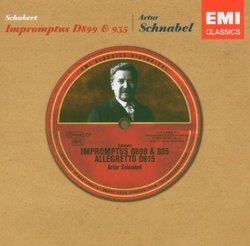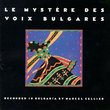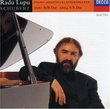| All Artists: Franz [Vienna] Schubert, Artur Schnabel Title: Schubert: Impromptus, D899 & 935 Members Wishing: 0 Total Copies: 0 Label: EMI Classics Release Date: 6/7/2005 Album Type: Original recording remastered Genre: Classical Styles: Chamber Music, Historical Periods, Classical (c.1770-1830), Modern, 20th, & 21st Century Number of Discs: 1 SwapaCD Credits: 1 UPC: 724358683325 |
Search - Franz [Vienna] Schubert, Artur Schnabel :: Schubert: Impromptus, D899 & 935
 | Franz [Vienna] Schubert, Artur Schnabel Schubert: Impromptus, D899 & 935 Genre: Classical
|
Larger Image |
CD DetailsSimilarly Requested CDs
|
CD ReviewsAmazing musicianship John Kounios | Philadelphia, PA, USA | 10/12/2006 (5 out of 5 stars) "Simply put, there have been a lot of great pianists over the years, but none was greater than Artur Schnabel. His interpretations have a depth that has not been exceeded. This rerelease of his recordings of the Schubert Impromptus is a perfect example. He had the remarkable ability to play Schubert with dynamism and intensity while maintaining the lyrical, dreamy quality that is esential to Schubert's music. Two points to consider before buying this disk. The original recordings were made during the 1930s and 1940s, and the sound quality is poor by modern standards. Second, there are a few wrong notes. Sound editing was impossible in those days, and Schnabel felt that conveying the essence of the music was more important that technical perfection. So he sometimes went with takes that were technically imperfect. These occassional slips are not the result of technical inadequacies on his part, but rather because he had to take big chances when he played in order to convey what he wanted to convey. (The best example of this is his notorious recording of Beethoven's Hammerklavier Sonata, which is rife with finger slips, but is nevertheless the greatest recording that this work has ever received -- Schnabel was the only pianist with the guts and brains to play the piece at close to Beethoven's breakneck metronome markings.) So he sometimes refused to re-record a piece if he thought that the possible technical improvement would be at the cost of a performance that was less emotional. However, neither of these points should deter anyone from buying this amazing disk. The quality of the intepretations is mesmerizing and you will quickly learn to overlook the archaic sound and occassional slips of the finger. After you listen to this recording a few times, you won't be able to listen to anyone else's recording of the Impromptus." Schnabel's final recordings Toma Manojlovic | belgrade,serbia | 05/14/2007 (5 out of 5 stars) "Made less than a year before his death,these are great pianists final recordings.There were plans for others,but for some reason,they never materialised.It is equaly depressing to know that none of his last concerts were recorded.But what we do have of his interpretations is,in my opinion,more than enough for a claim that he was the gratest pianist of the last century. These recordings of Impromptus are rather well known,and justly called the definitive,so I will not bother the fellow Schnabel enthousiast with any aditional(though,well deserved)praise.Few words about this edition,though. It must be said that the transfer issued by Music and Arts as a part of their box-set of Schnabel's complete Schubert recordings does sound better.Remastered by Mark Obert Thorn,well known for his efforts on Schnabel's recordings issued recently by Naxos,they are a great improvement over this 2005.EMI disc.Still,the transfer on this CD is certainly not bad,it has been made from the original tapes(which,unfortunately,do show some traces of deterioration compared with the transfer done for the late '80. edition of these recordings)and is certainly a better buy if you want the Impromptus only.But for those interested in the entire Schnabel's Schubert output,go for the Music and Arts set(five discs priced as four)." Schnabel Plays Schubert Impromptus Robin Friedman | Washington, D.C. United States | 06/19/2009 (5 out of 5 stars) "Franz Schubert (1797 -- 1828) wrote two sets of impromptus -- short improvisatory-like pieces for the piano -- in the final year of his short life. The two collections, Opus 90, D. 899, and the posthumously-published Opus 142, D. 935, each include four compositions. Some listeners consider the latter set as an integrated whole, virtually like a sonata. Schubert composed the impromptus to be within the range of amateur pianists and to be played in the home. I have studied several of them over the years on the piano. But the impromptus moved to the concert stage and recording studios and have become among the most beloved of Schubert's instrumental compositions.
There are many outstanding contemporary recordings of the impromptus. This historical recording by Arthur Schnabel (1882 -- 1951) should be known by all lovers of Schubert. Although he commanded a large repertoire, beginning in 1930, Schnabel concentrated on the works of Beethoven, and increasingly on Schubert and Mozart, which he deemed inexhaustible in their meaning and subtelty. His recordings of the impromptus date from 1950, late in his career. They are available in this recording at a budget price as well as in a recently-released 5-CD compilation of Schnabel's complete recorded performances of Schubert. The sound quality of the recordings in not up to modern standards, but it is adequate. Listening to these recordings made me understand why one would want to give one's life to this music. Schnabel takes these small, lyrical compositions and plays them seriously and on a large scale. His performances capture the dazzling shifts of emotion in these works, from the dark and passionate to the exultant. He plays with a strongly propulsive rhythm and at rapid tempos. These are deeply thought out and felt performances. There are slips along the way which would not be allowed in contemporary recordings. In the A-flat impromptu of Opus 90, Schnabel appears to have a lapse of memory and omits several measures in the last section of the piece. (I can understand this, as I my teacher pointed out I was forgetting to play several measures while performing a different impropmtu from the set.) These remain benchmark readings of this music. The opus 90 set begins with a fairly lengthy work in C minor which develops a single theme in varied march-like and lyrical passages. The second impromptu in E-flat includes wayward and wild runs in the right hand over the keyboard accompanied by a melody in the left. The trio section and the concluding coda are contrastingly turbulent and stormy. The third impromptu in G flat is lyrical and songlike with a fluttering accompaniment and strong figures in the left hand. The final impromptu in this set opens with a repeated figuration in the right hand, which breaks into an eloquent melody in triplets, and a romantic nocturnal trio. In the opus 142 set, the second impromptu in A-flat is probably the one most often attempted by young pianists. It has a slow flowing melodic theme and a trio section which requires care in bringing out the beautiful melody. My favorite of this set in the third impromptu in b-flat which consists of an endearingly simple melody followed by five variations. The first work of this set, in f minor, is in sonata form with passages of hand-crossing over the keyboard while the finale is a scherzo full of long, lacy runs and triplets. The CD concludes with a short, rarely performed late work, the Allegretto in C minor, D.915, which Schubert composed upon the death of a friend. Lovers of Schubert or the piano will treasure this historical recording of a great musician performing beautifully poignant music at a budget price. Robin Friedman" |

 Track Listings (9) - Disc #1
Track Listings (9) - Disc #1








